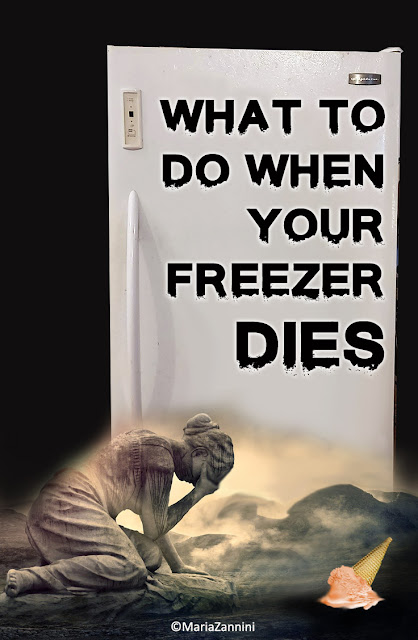What To Do When Your Freezer Dies
The older of our two freezers died last week. We would've gone into mourning but we were too busy trying to save our frozen food.
It was about 20 years old which I guess is a fair lifetime nowadays, though I do have a spare refrigerator that's from the early 1980s. I doubt we'll see its like again. They don't build 'em like they used to.
We made a momentous decision not to replace our dearly departed freezer. I didn't reach that decision lightly. I had to look into my crystal ball and decide if it was worth keeping a second freezer at our age. While we can use it now we might not use it as much ten years from now. Why not downsize while we can. More canning, less freezing.
When an appliance dies it rarely gives you warning, so it's always good to have a backup plan. This particular freezer has been giving us alarms for weeks. I knew it was on its last legs, so I tried to keep frozen foods rotated in that freezer.
In the end, I lost a few bags of frozen veggies. The soggy pole beans and peppers I threw into the compost. Defrosted squash casseroles went to the chickens and some goat's milk fed our septic system with good bacteria. I managed to save the peas, Brussels sprouts, and edamame.
Meat, fish, and turkeys were solid enough to be transferred, but that meant emptying my other freezer of all unnecessary boarders, like flour, quinoa, pasta, and crackers. With them gone, I had enough room to transfer the essentials back into life support.
The worst part about losing the freezer is having to get rid of its empty carcass. It's always a hassle. My trash service charges a hefty fee, but I managed to find someone on Nextdoor that takes scrap appliances.
So what should your game plan be when losing a major appliance?
- Do NOT open your freezer until you're ready to empty it. The longer it stays shut the longer it'll stay cool.
- Make space in your alternate spaces. If you don't have a spare freezer, use every cooler you can find and fill it with ice. Ask a neighbor if they have room in their freezer for one or two valuable foods.
- Once you have a new home established for your orphaned food stuffs, get your family involved and form a tag team. You want to work quickly.
- Transfer the most delicate food first. For us, it was the fish, which will thaw fastest. It helps if your frozen food has dedicated shelves so you can pull them quickly. I store my food by type: one shelf each for beef, pork, seafood, and chicken. Pull out drawers hold veggies and processed meats like bacon and sausage.
- Since food in the dead freezer was probably starting to thaw pull out the most perishable food for eating that week and leave it in your fridge to finish thawing.
- Count on the fact that some things might not make it.
It's a tragedy to lose a major appliance. Much like triage, you want to save as much as you can in as little time as possible because time is your enemy.
Despite the emergency, we moved everything in under fifteen minutes.
It really helps if your freezer is organized. Label everything. Keep like items on the same shelves or in bins. Make sure you use freezer friendly storage containers. Cheap bags or containers can cause freezer burn or leave a soggy mess if your freezer goes out for any length of time. I try to check mine daily, but these things can happen any time. You just never know.
What was the last major appliance you lost? How did you get rid of it once it was declared dead?
**I'm an Amazon affiliate. If you happen to be shopping Amazon, be a pal and start from this link. Thanks! I appreciate it.
This post may contain affiliate links, I earn from qualifying purchases at no extra cost to you. Click here for my disclosure policy


Comments
I did partition that old freezer with old plastic covered grates so at least I could divide it between meats, casseroles, and veg, but it was still a pain. I never regretted switching to upright freezers.
Buy the upright when you can. It makes life so much easier.
*tosses fairy dust*
May your new fridge live long enough to serve your great grandchildren. :)